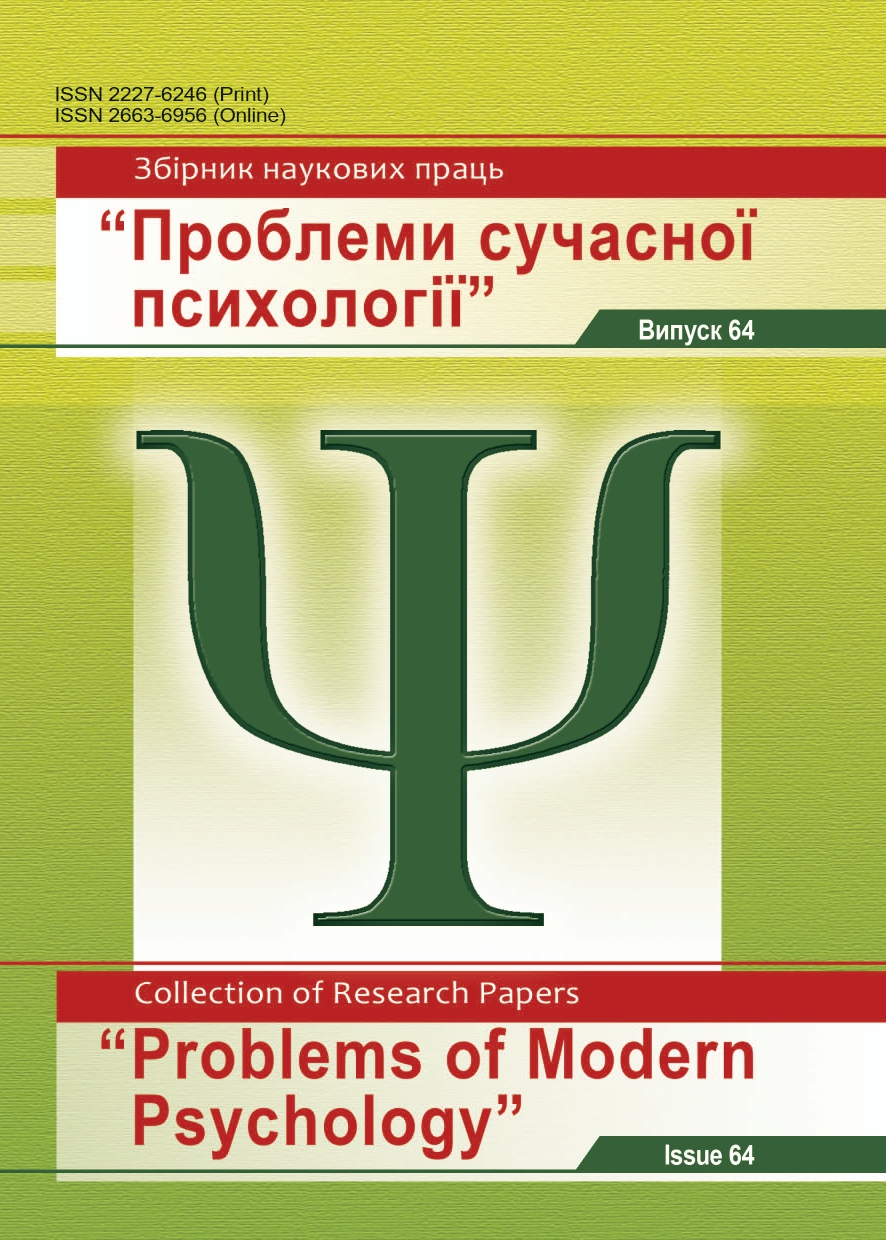Психологічний зміст провідної ролі фасилітативної діяльності
DOI:
https://doi.org/10.32626/2227-6246.2024-64.115-137Ключові слова:
фасилітація, фасилітативна взаємодія, самоактуалізація, індивідуальність особистості, освіта та виховання як фасилітативна передумова, розвиток індивідуальності, особистісне зростання, психолого-педагогічний супровід, суб’єктний досвід, однакове ставленняАнотація
Мета нашого дослідження – показати психологічний зміст провідної ролі фасилітативної діяльності, висвітлити ці основні ідеї відповідно до принципів фасилітації та фасилітативної взаємодії.
Методи дослідження. Для розв’язання поставлених завдань використовувалися такі теоретичні методи дослідження: категоріальний, структурно-функціональний, аналіз, систематизація, моделювання, узагальнення. Також у своєму дослідженні ми використовували емпіричні методи, такі як пілотне дослідження.
Результати дослідження. Атрибутивний аналіз фасилітації як діяльності дозволив нам не тільки виявити і привести у взаємну відповідність її атрибути, а й встановити, що дана діяльність може бути базовою для вчителів та учнів у системі закладів середньої освіти. У статті показано, що положення щодо соціальної сутності особистості, провідної ролі діяльності в процесі її розвитку, щодо особистісно зорієнтованого підходу в психології постають методологічною основою виокремлення принципу фасилітації в процесі навчання та міжособистісної взаємодії, загальною нормою організації освітнього процесу тощо. У своїй сукупності вони дозволяють за допомогою урахування цілісної системи взаємопов’язаних понять, ідей і способів виконання дій та діяльності забезпечувати підтримку процесів самовияву, саморозвитку і самореалізації особистості педагога, розвитку його унікальної індивідуальності. Отже, виокремимо деякі базові ідеї, які становлять сутність принципу фасилітації: щодо свободи особистості; стосовно потреби людини в самоактуалізації; щодо індивідуальності людини; стосовно навчання і виховання як фасилітативних передумов людини в розвиткові індивідуальності та особистісному зростанні; щодо психолого-педагогічної підтримки; стосовно розвитку суб’єктного досвіду людини в процесі життєдіяльності; щодо довіри і віри в людину, її індивідуальність; стосовно однакового ставлення до всіх учасників педагогічного процесу тощо.
Висновки. Доведено, що ідеї фасилітативної взаємодії, інтеріоризовані педагогом, безпосередньо є включеними в його суб’єктний досвід і створюють цілісну структуру «Я» педагога. В існуючих традиціях організації навчання суб’єктний досвід учасників міжособистісної взаємодії розглядається як недосконалий, несуттєвий, обтяжений випадковими уявленнями, і тому фасилітативна міжособистісна взаємодія або ігнорується, або нівелюється, або штучно перероблюється. Фасилітація великою мірою імплікує суб’єктний досвід усіх учасників освітнього процесу, впливає на становлення різних і неповторних особистостей.
##submission.downloads##
Опубліковано
Як цитувати
Номер
Розділ
Ліцензія
Авторське право (c) 2024 Хупавцева Наталія, Співак Віталій

Ця робота ліцензується відповідно до Creative Commons Attribution-NonCommercial 4.0 International License.
Редакція має повне право публікувати у Збірнику оригінальні наукові статті як результати теоретичних і експериментальних досліджень, які не знаходяться на розгляді для опублікування в інших виданнях. Автор передає редколегії Збірника права на розповсюдження електронної версії статті, а також електронної версії англомовного перекладу статті (для статей українською та російською мовою) через будь-які електронні засоби (розміщення на офіційному web-сайті Збірника, в електронних базах даних, репозитаріях та ін).
Автор публікації зберігає за собою право без узгодження з редколегією та засновниками використовувати матеріали статті: а) частково чи повністю в освітніх цілях; б) для написання власних дисертацій; в) для підготовки абстрактів, доповідей конференцій та презентацій.
Автор публікації має право розміщувати електронні копії статті (у тому числі кінцеву електронну версію, завантажену з офіційного web-сайту Збірника) на:
- персональних web-ресурсах усіх Авторів (web-сайти, web-сторінки, блоги тощо);
- web-ресурсах установ, де працюють Автори (включно з електронними інституційними репозитаріями);
- некомерційних web-ресурсах відкритого доступу (наприклад, arXiv.org).
Але в усіх випадках обов’язковою є наявність бібліографічного посилання на статтю або гіперпосилання на її електронну копію, що містяться на офіційному сайті Збірника.






